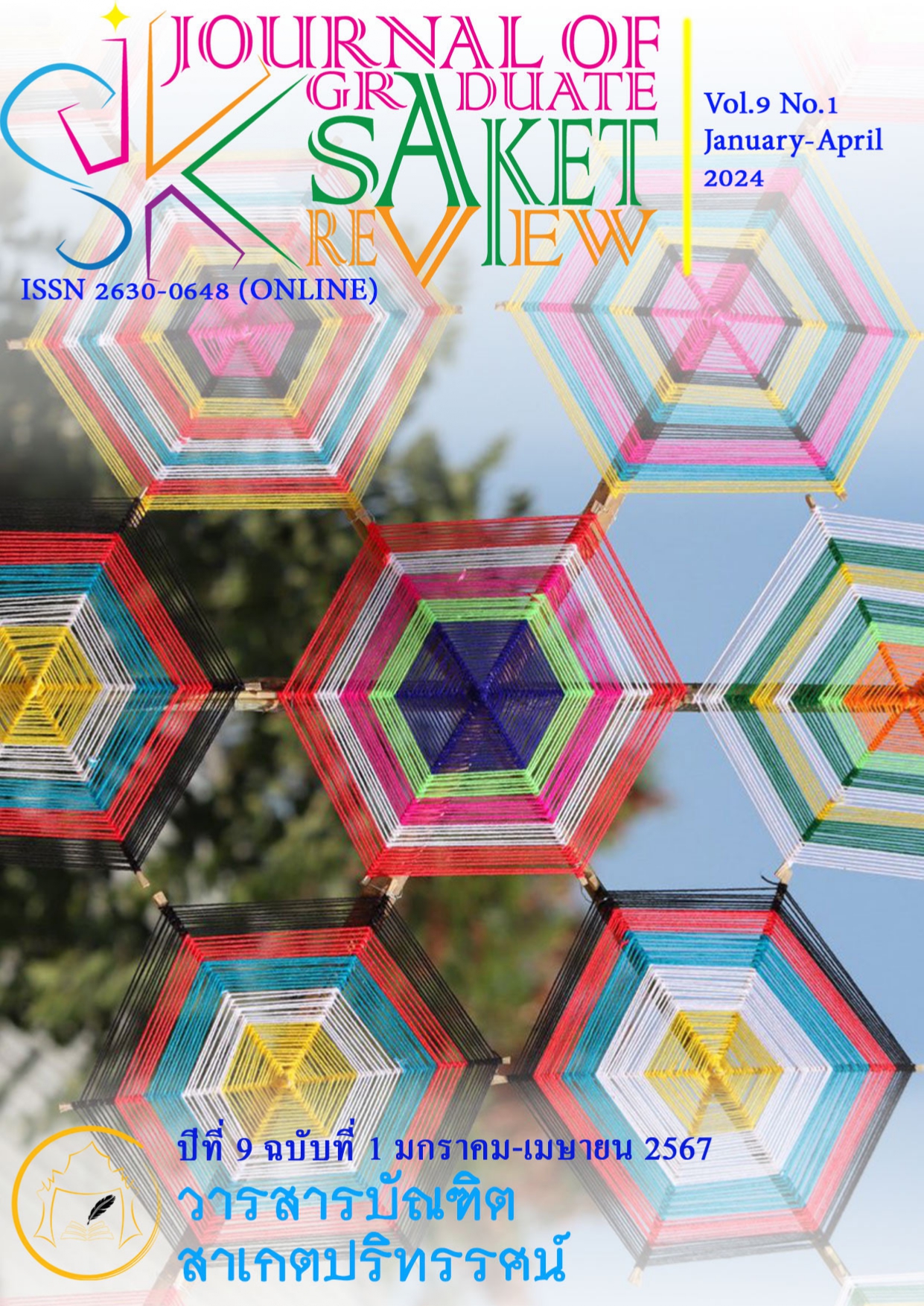Desirable Characteristics of School Administrators in The 21th Century of Phetburi Province
Main Article Content
Abstract
The objectives of this research were to analyze the factors of desirable characteristics and investigate the level of opinions toward the desirable characteristics of school administrators in 21st century of Phetburi province. By theoretical concepts from documents related articles and research which has comprehensive content based on the variables used in the research and then determines the questions using a rating scale. The sample group used were administrators and teachers in educational institution administrators under the Office of the Private Education Commission in 2023, totaling 22 places, and using a simple random sampling method to obtain the entire sample group 266 people. The research results found that components of desirable characteristics of educational administrators in the 21st century in Phetchaburi Province have 5 aspects and 30 variables, including 1) Using innovation and technology, 11 variables, 2) vision and foresight, 9 variables, 3) personality, 4 variables, 4) Administrative skills, 4 variables. 5) Responsibility, 2 variables, with a total variance of 68.872 percent. For opinions regarding the components of desirable characteristics of educational administrators in the 21st century, the overall level was at the highest level. The Administrative skills aspect had the highest average, followed by Vision and foresight, Personality, Using innovation and technology and scope of Responsibility respectively.
Article Details

This work is licensed under a Creative Commons Attribution-NonCommercial-NoDerivatives 4.0 International License.
เนื้อหาและข้อมูลในบทความที่ลงตีพิมพ์ในวารสารบัณฑิตสาเกตปริทรรศน์ ถือเป็นข้อคิดเห็นและความรับผิดชอบของผู้เขียนบทความโดยตรงซึ่งกองบรรณาธิการวารสาร ไม่จำเป็นต้องเห็นด้วย หรือร่วมรับผิดชอบใด ๆบทความ ข้อมูล เนื้อหา รูปภาพ ฯลฯ ที่ได้รับการตีพิมพ์ในวารสารบัณฑิตสาเกตปริทรรศน์ ถือเป็นลิขสิทธิ์ของวารสารบัณฑิตสาเกตปริทรรศน์ หากบุคคลหรือหน่วยงานใดต้องการนำทั้งหมดหรือส่วนหนึ่งส่วนใดไปเผยแพร่ต่อหรือเพื่อกระทำการใด ๆ จะต้องได้รับอนุญาตเป็นลายลักอักษรจากวารสารบัณฑิตสาเกตปริทรรศน์ ก่อนเท่านั้น
References
ภาษาไทย
กิ่งแก้ว ห้วยจันทร์. (2560). คุณลักษณะที่พึงประสงค์ของผู้บริหารสถานศึกษาตามทัศนะของครูในเขตอำเภอศรีราชา สังกัดสำนักงานเขตพื้นที่การศึกษามัธยมศึกษา เขต 18. วิทยานิพนธ์ปริญญามหาบัณฑิตมหาวิทยาลัยบูรพา.
ชัยยนต์ เพาพาน. (2558). ผู้บริหารสถานศึกษายุคใหม่ในศตวรรษที่ 21. การประชุมวิชาการระดับชาติครุศาสตร์ ครั้งที่ 1 การจัดการศึกษาเพื่อพัฒนาท้องถิ่นสู่ประชาคมอาเซียน : ทิศทางใหม่ในศตวรรษที่ 21. ขอนแก่น: มหาวิทยาลัยขอนแก่น.
ชัยยนต์ เพาพาน. (2559). แนวคิดและทฤษฎีพื้นฐานการเป็นผู้นำของผู้บริหารสถานศึกษาในศตวรรษที่ 21. ในการประชุมวิชาการระดับชาติครุศาสตร์ ครั้งที่ 1 การจัดการศึกษาเพื่อพัฒนาท้องถิ่นสู่ประชาคมอาเซียน : ทิศทางใหม่ในศตวรรษที่ 21. กาฬสินธุ์: มหาวิทยาลัยกาฬสินธุ์.
ธีระ รุญเจริญ. (2557). E-Leadership ผู้นำการศึกษาในยุคดิจิตอล. วารสารวิชาการ. 7(1), 55-62.
เบญจพร สุคนธร. (2565). บทบาทของผู้บริหารสถานศึกษาในการส่งเสริมการจัดการเรียนการสอนออนไลน์ สังกัดสำนักงานเขตพื้นที่การศึกษามัธยมศึกษา กรุงเทพมหานคร เขต 2. วิทยานิพนธ์ปริญญามหาบัณฑิต มหาวิทยาลัยเกริก.
พลากร ขุริมนต์ และคณะ. (2561). อนาคตภาพของการบริหารโรงเรียนประถมศึกษาโดยใช้เทคโนโลยีสารสนเทศและการสื่อสาร ในทศวรรษหน้า (พ.ศ. 2562-2571). วารสารมนุษยศาสตรและสังคมศาสตร์ มหาวิทยาลัยราชภัฎสุรินทร์. 20(2), 29–40.
ศิริลักษณ์ มีจันโท. (2560). การศึกษาความสัมพันธ์ระหว่างคุณลกัษณะของผู้บริหารสถานศึกษากับการเป็นองค์กรแห่งการเรียนรู้ของสถานศึกษา สังกัดสำนักงานเขตพื้นที่การศึกษาประถมศึกษาพระนครศรีอยุธยา เขต 1. วิทยานิพนธ์ปริญญามหาบัณฑิต มหาวิทยาลัยราชภัฏพระนครศรีอยุธยา.
สมศักดิ์ เจริญพานิชเสรี. (2558). คุณลักษณะของผู้บริหารสถานศึกษาในสภาพปัจจุบันและในยุคปฏิรูปการศึกษา ตามความคิดเห็นของผู้บริหารสถานศึกษาและครูในสำนักงานการ ประถมศึกษาศึกษา จังหวัดสุพรรณบุรี. วิทยานิพนธ์ครุศาสตรมหาบัณฑิต มหาวิทยาลัยบูรพา.
ภาษาอังกฤษ
Charoenpanichseree S. (2015). Characteristics of educational institution administrators in the present condition and in the era of educational reform According to the opinions of educational institution administrators and teachers in the Office of Primary education Suphanburi Province. Master of Education Thesis Burapha University.
Cronbach, L. J. (1990). Essentials of psychological testing. 5th ed. New York: Harper Collins Publishers.
Ekakul T. (2000). Research methods in behavioral and social sciences. Ubon Ratchathani Rajabhat Institute.
George Couros. (2010). The 21st Century Principal. Retrieved on 15 September 2019, from http://connectedprincipals.com/archives/1663.
Hair Jr. Et al. (2010). Multivariate Data Analysis: A Global Perspective. 7th Edition. Pearson Education, Upper Saddle.
Khurimon P. et al. (2018). The future outlook for primary school administration using information and communication technology in the next decade (2019-2028). Journal of Humanities and Social Sciences Surin Rajabhat University. 20(2), 29–40.
Huaichan K. (2017). Desired characteristics of educational institution administrators according to the views of teachers in Sriracha District Under the jurisdiction of the Secondary Educational Service Area Office 18. Master's Thesis, Burapha University.
Krejcie, R.V., & D.W. Morgan. (1970). Determining Sample Size for Research Activities. Educational and Psychological Measurement. 30(3), 607-610.
Meechantho S. (2017). A study of the relationship between the characteristics of educational institution administrators and being a learning organization of educational institutions. Under the jurisdiction of the Phra Nakhon Si Ayutthaya Primary Educational Service Area Office, Area 1. Master's degree thesis. Phranakhon Si Ayutthaya Rajabhat University.
Phaphan C. (2015). Modern educational institution administrators in the 21st century. 1st National Academic Conference on Education. Educational management for local development towards the ASEAN community: new directions in the 21st century. Khon Kaen: Khon Kaen University. .
________. (2016). Basic concepts and theories of leadership Leadership of educational institution administrators in the 21st century. At the 1st National Academic Conference on Education. Educational management for local development towards the ASEAN community: new directions in the 21st century. Kalasin: Kalasin University.
Runcharoen T. (2014). E-Leadership: Educational leadership in the digital age. Academic Journal. 7(1), 55-62.
Sukhonthorn B. (2022). The role of educational institution administrators in promoting online teaching and learning Under the jurisdiction of the Secondary Educational Service Area Office Bangkok, District 2. Master's degree thesis. Krirk University.


